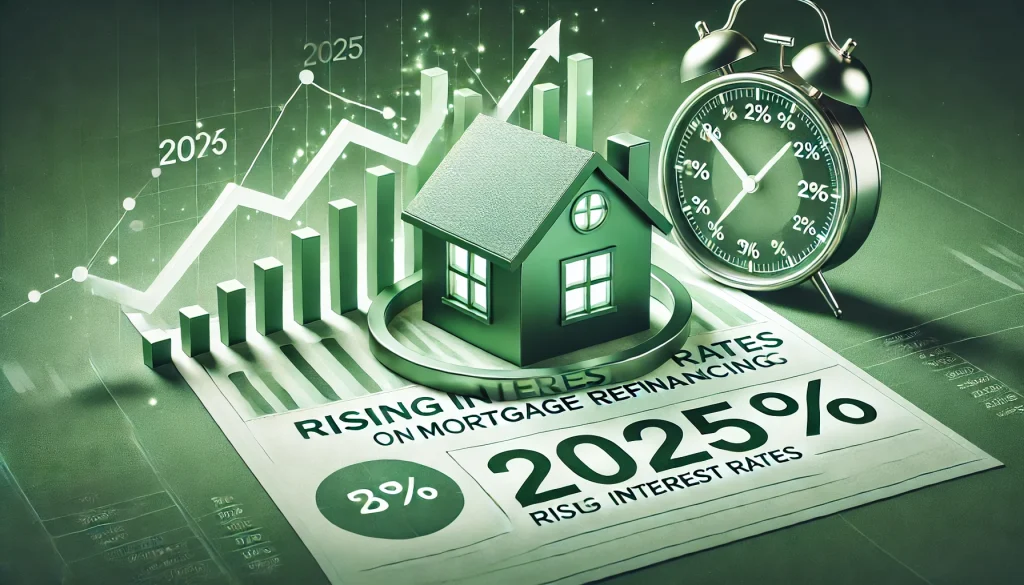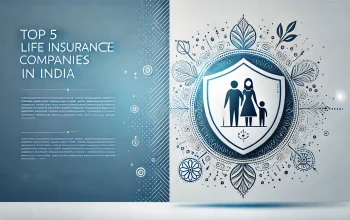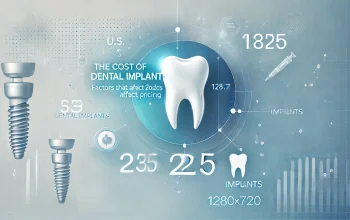How Rising Interest Rates Will Affect Mortgage Refinancing in 2025

As we approach 2025, the mortgage market faces a crucial turning point. Rising interest are a significant factor that will directly impact mortgage refinancing decisions for millions of homeowners. While refinancing has been a popular financial tool to reduce monthly payments or change the terms of a loan, increasing rates may challenge homeowners looking to lower their borrowing costs in the future. This article explores how rising interest will affect mortgage refinancing in 2025, with insights into the opportunities and challenges that lie ahead.
Table of Contents
What is Mortgage Refinancing?
Mortgage refinancing is the process of replacing an existing mortgage with a new one, typically at a lower interest rate or with different loan terms. Homeowners refinance for various reasons, including:
- Lowering monthly payments
- Shortening the loan term
- Switching from an adjustable-rate mortgage (ARM) to a fixed-rate mortgage
- Accessing home equity for cash (cash-out refinance)
In a low-interest environment, refinancing can save homeowners a significant amount of money. However, as interest rise, the benefits of refinancing may diminish, making it more challenging to secure a lower rate or better loan terms.
The Role of Interest Rates in Mortgage Refinancing
Interest play a critical role in determining whether refinancing is a financially viable option for homeowners. When rates are low, refinancing can lead to lower monthly payments and reduced interest costs over the life of the loan. However, as rates rise, the cost of borrowing increases, making refinancing less attractive.
In 2025, interest are expected to continue their upward trajectory due to inflationary pressures, changes in Federal Reserve policy, and economic recovery from the COVID-19 pandemic. This shift will directly affect the mortgage market and refinancing options for homeowners.
Why Are Interest Rates Rising?
Several factors contribute to the rise in interest rates:
- Inflation: As inflation increases, central banks, including the Federal Reserve, raise interest rates to control rising prices. Higher rates make borrowing more expensive, which can slow down consumer spending and help reduce inflation.
- Economic Growth: With the global economy recovering from the pandemic, demand for goods and services is increasing. This growth pushes up prices and wages, leading to inflationary pressures and higher interest rates.
- Federal Reserve Policy: The Federal Reserve adjusts interest rates to stabilize the economy. When inflation rises or the economy is growing too quickly, the Fed increases rates to cool down the economy and prevent it from overheating.
In response to these economic conditions, the Federal Reserve is likely to continue raising interest rates in 2025, which will have a direct impact on mortgage rates.
How Rising Interest Rates Will Affect Mortgage Refinancing in 2025
1. Fewer Refinancing Opportunities for Lower Rates
One of the most immediate effects of rising interest rates is that refinancing to lower rates will become less common. Homeowners who secured low mortgage rates in previous years will find that refinancing in 2025 may not result in savings. In fact, refinancing to a higher interest rate could lead to increased monthly payments and a longer repayment period.
For example, if you currently have a 3% interest rate on your mortgage and rates rise to 5% or higher in 2025, refinancing will likely increase your borrowing costs, making it an unattractive option. This could lead to a significant decline in the number of homeowners refinancing to lower their rates, particularly those who locked in low rates during 2020-2022.
2. Fewer Cash-Out Refinances
A cash-out refinance allows homeowners to borrow more than they owe on their mortgage, using the excess funds for other expenses, such as home improvements or debt consolidation. However, with rising interest rates, cash-out refinancing will become more expensive in 2025.
The higher the interest rate, the more costly it becomes to borrow additional funds through a cash-out refinance. Homeowners may find that the benefits of accessing their home equity are outweighed by the increased interest costs. As a result, fewer homeowners may choose cash-out refinancing in 2025, opting for alternative ways to access funds, such as home equity loans or lines of credit.
3. Adjustable-Rate Mortgages (ARMs) Becoming Less Attractive
Adjustable-rate mortgages (ARMs) typically offer lower initial interest rates compared to fixed-rate mortgages. However, as interest rates rise, the adjustable rates on ARMs will also increase, leading to higher monthly payments for homeowners with these loans.
In 2025, homeowners with ARMs may see significant increases in their mortgage payments as interest rates adjust. For these homeowners, refinancing to a fixed-rate mortgage could provide stability and predictability. However, if interest rates are already high, the fixed-rate mortgage may not offer substantial savings compared to their existing ARM.
4. Increased Demand for Fixed-Rate Mortgages
As interest rates rise, more homeowners may seek the security of fixed-rate mortgages. Fixed-rate mortgages lock in an interest rate for the life of the loan, protecting homeowners from future rate increases.
In 2025, refinancing from an ARM to a fixed-rate mortgage could be a smart move for homeowners who want to avoid the uncertainty of rising rates. However, those looking to refinance will need to carefully weigh the costs and benefits, as fixed-rate mortgages may carry higher rates in a rising interest rate environment.
5. Stricter Qualification Criteria for Refinancing
As interest rates rise, lenders may tighten their qualification criteria for refinancing. Higher interest rates mean increased risk for lenders, so they may require borrowers to have stronger credit scores, lower debt-to-income ratios, and higher home equity to qualify for refinancing.
In 2025, homeowners looking to refinance may face stricter lending standards, making it more difficult to qualify for favorable terms. Borrowers with lower credit scores or higher debt levels may find it challenging to secure refinancing, even if they are in a financial position to benefit from changing their loan terms.
Alternatives to Refinancing in 2025
With rising interest rates, homeowners may need to consider alternative financial strategies instead of refinancing. Here are some options to explore:
1. Home Equity Loans or HELOCs
Instead of refinancing, homeowners may choose to access their home equity through a home equity loan or home equity line of credit (HELOC). These loans allow you to borrow against the equity in your home without changing the terms of your existing mortgage.
- Home Equity Loans: Provide a lump sum with a fixed interest rate, making it easier to budget for repayments.
- HELOCs: Offer a line of credit that can be drawn upon as needed, with variable interest rates. However, rising rates could make HELOCs more expensive in 2025.
Both options allow homeowners to access cash without refinancing their entire mortgage, making them attractive alternatives in a high-interest-rate environment.
2. Loan Modifications
If refinancing is not an option, some homeowners may be able to negotiate loan modifications with their lenders. Loan modifications involve changing the terms of your existing mortgage to make it more affordable. This could include extending the loan term, lowering the interest rate, or changing the type of loan.
While loan modifications are not as common as refinancing, they may be a viable solution for homeowners who are struggling with rising interest rates and increased mortgage payments.
3. Paying Off the Mortgage Early
For homeowners with extra cash on hand, paying off a mortgage early could be a smart move in 2025. By making additional payments toward the principal balance of your mortgage, you can reduce the total amount of interest paid over the life of the loan.
This strategy is particularly effective in a rising interest rate environment, as it helps homeowners avoid paying higher interest on future payments. Additionally, paying off the mortgage early can provide financial freedom and reduce monthly expenses, especially for retirees or those nearing retirement.
Preparing for Rising Interest Rates in 2025
As we move into 2025, it’s essential for homeowners to prepare for the impact of rising interest rates on mortgage refinancing. Here are some steps to consider:
1. Monitor Interest Rate Trends
Keep an eye on the Federal Reserve’s policies and economic indicators that influence interest rates. By staying informed about rate changes, you can time your refinancing decision more effectively and avoid locking in a higher rate than necessary.
2. Check Your Credit Score
A higher credit score can help you qualify for better refinancing terms, even in a rising rate environment. Before applying for refinancing, review your credit report and take steps to improve your score if needed. Paying down debt, correcting errors, and making timely payments can boost your credit score and improve your refinancing prospects.
3. Consider the Long-Term Financial Impact
When deciding whether to refinance, consider the long-term financial impact of rising interest rates. Will refinancing save you money over the life of the loan, or will it increase your monthly payments? Use online mortgage calculators to estimate your costs and weigh the pros and cons of refinancing in 2025.
Conclusion
Rising interest rates in 2025 will present both challenges and opportunities for homeowners considering mortgage refinancing. While securing a lower rate may become more difficult, refinancing can still provide benefits for those looking to change their loan terms or switch from an ARM to a fixed-rate mortgage. Homeowners should carefully evaluate their financial situation, monitor interest rate trends, and explore alternative options, such as home equity loans or loan modifications, to make the best decision for their needs. By staying informed and proactive, homeowners can navigate the changing mortgage landscape in 2025 and beyond.



1 thought on “How Rising Interest Rates Will Affect Mortgage Refinancing in 2025”